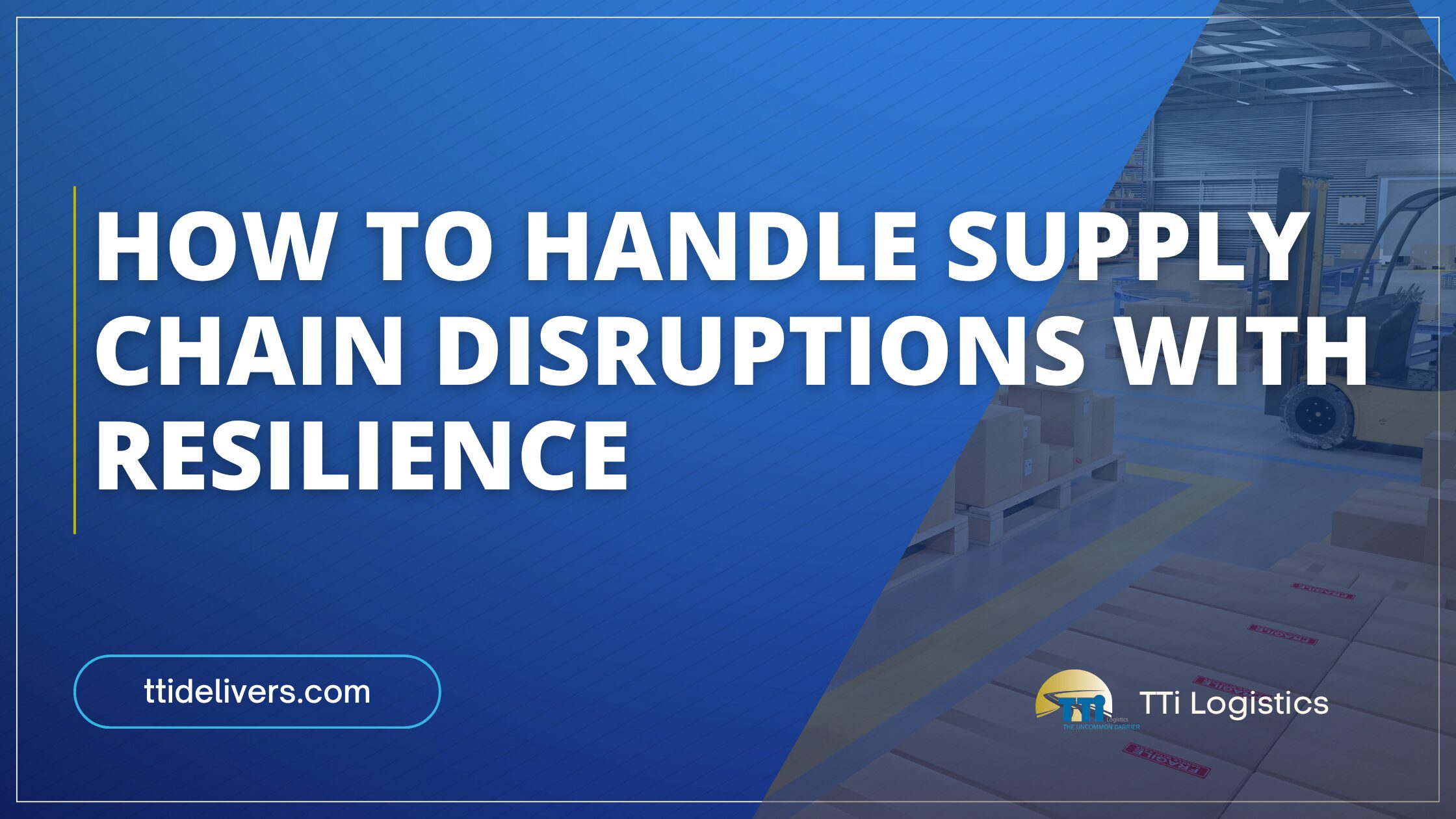Preparing Your Logistics for the Unexpected
In today’s unpredictable world, maintaining supply chain resilience has become a top priority for businesses across industries. From global conflicts and economic shifts to natural disasters and port congestion, disruptions can strike at any time—threatening delivery schedules, profit margins, and customer trust. The key to navigating these challenges lies in building a flexible and strategic supply chain that can adapt quickly when the unexpected happens.
At TTi Logistics, we understand that true supply chain resilience isn’t just about reacting to disruptions—it’s about preparing for them, minimizing their impact, and recovering faster than competitors. In this blog, we’ll explore how companies can strengthen their logistics operations, mitigate risk, and maintain business continuity even in the face of major challenges.
Understanding Supply Chain Resilience
Supply chain resilience refers to the ability of a company’s supply chain to anticipate, withstand, and recover from disruptions while continuing to meet customer needs. A resilient supply chain isn’t immune to problems—but it can adapt and bounce back faster, maintaining stability and trust even during turbulent times.
Recent years have made one thing clear: traditional, linear supply chains are no longer enough. Whether due to the pandemic, geopolitical conflicts, or extreme weather events, businesses have learned that supply chain resilience must be built on flexibility, visibility, and strategic partnerships.
1. Build Flexibility into Your Logistics Network
The first step toward supply chain resilience is creating flexibility within your logistics operations. Rigid systems that rely on a single carrier, supplier, or distribution route are more vulnerable to disruption. Flexibility, on the other hand, allows companies to pivot quickly when challenges arise.
This includes maintaining multiple carrier options, alternative transportation modes, and regional distribution centers. As a proud partner of UniGroup, TTi Logistics has access to over 700 warehouse locations across the country, ensuring that our clients always have storage and distribution options no matter where their products need to go.
By having a flexible logistics network, you enhance supply chain resilience and ensure that even if one route or facility is compromised, your products can continue to move efficiently through another channel. Building flexibility into your systems is one of the most effective ways to create supply chain resilience that stands the test of time.
2. Prioritize Visibility and Real-Time Data
You can’t manage what you can’t see. Visibility is one of the most critical factors in achieving supply chain resilience. When companies have real-time insight into where their shipments are, how inventory is moving, and where potential delays may occur, they can act proactively rather than reactively.
Modern logistics technology—such as IoT tracking, GPS-enabled freight monitoring, and advanced warehouse management systems—provides the transparency needed to stay ahead of disruptions.
At TTi Logistics, we integrate advanced tracking tools and communication systems that give our clients complete visibility from pickup to delivery. This real-time data is the foundation of supply chain resilience, helping businesses make faster, smarter decisions and avoid costly downtime. The ability to see issues before they escalate is what sets resilient supply chains apart and defines long-term supply chain resilience.
3. Develop Strong Supplier and Carrier Relationships
When disruption strikes, relationships matter. Having trusted partners who understand your business and can adapt with you is essential for maintaining supply chain resilience.
By working with reliable suppliers, freight forwarders, and logistics providers like TTi Logistics, businesses gain the advantage of proven collaboration and quick response. We work closely with clients to anticipate their needs, streamline coordination, and ensure smooth execution even when external challenges arise.
A long-time partner recently shared:
“TTI has been a proven partner for over a decade. Each and every project seems to be different from the last. They are able to handle the unexpected changes and unknown challenges that often occur in our industry. Our customers benefit from their logistical experience.”
– Vice President/General Manager, Visual Communications Company
This kind of trust and adaptability underscores what supply chain resilience looks like in action—consistent reliability, even when circumstances are unpredictable.
Building supply chain resilience also means having open communication and mutual trust with all partners in your logistics network. This collaborative approach helps everyone stay aligned and ready to act when adjustments are needed.
4. Diversify Sourcing and Distribution
Another pillar of supply chain resilience is diversification. Relying on a single source or region for materials, products, or warehousing can expose a business to significant risk. By diversifying suppliers and distribution hubs, companies can reduce dependence on any one region or vendor.
For example, a company that imports all materials from a single country might face shutdowns during geopolitical conflict or trade restrictions. But if that same company has suppliers in multiple countries—or domestic options—they can keep operations running smoothly.
With TTi Logistics, businesses can leverage nationwide warehousing, multiple carrier partnerships, and flexible routing solutions to increase redundancy and minimize risk. This approach builds supply chain resilience by ensuring continuity even if one channel is disrupted. Diversification, combined with strong communication, is one of the hallmarks of lasting supply chain resilience.
5. Implement Risk Management and Contingency Planning
Resilient companies don’t just hope for the best—they plan for the worst. A solid risk management strategy is a cornerstone of supply chain resilience.
This involves identifying potential weak points in your logistics network, creating “what-if” scenarios, and developing contingency plans for each. Whether it’s rerouting freight during a port strike or securing additional warehouse capacity before peak season, planning ahead ensures that your business stays one step ahead of disruptions.
TTi Logistics works with clients to assess supply chain vulnerabilities, design flexible logistics plans, and ensure that alternative solutions are always in place. These proactive steps make supply chain resilience a built-in strength rather than an afterthought. Businesses that invest in risk management now will see the greatest payoff in future supply chain resilience.
6. Invest in Automation and Technology
Technology is one of the most effective ways to strengthen supply chain resilience. From predictive analytics to automation and real-time tracking, having the right systems in place helps businesses stay proactive, not reactive.
At TTi Logistics, technology isn’t an add-on — it’s built into every stage of the logistics process. Their advanced systems provide full visibility from pickup to final delivery, giving clients real-time updates and total transparency. With tools like barcode scanning, warehouse management systems, and AI-driven document automation, TTi ensures shipments and inventory are always tracked and optimized for efficiency.
TTi’s route optimization and project management platforms also enhance communication between all stakeholders, helping teams make informed decisions quickly when the unexpected happens. Plus, their upcoming EDI/API connectivity via the Descartes Global Logistics Network™ will allow seamless integration with partners worldwide — a major advantage in maintaining supply chain resilience even during global disruptions.
By investing in this technology, TTi Logistics helps clients minimize downtime, reduce errors, and maintain control, no matter what challenges arise.
7. Maintain Strategic Inventory Levels
While just-in-time models have long been popular for reducing storage costs, they can leave companies vulnerable when disruptions occur. A more balanced approach—known as “just-in-case” inventory management—has emerged as a best practice for supply chain resilience.
Keeping a strategic reserve of key products or materials helps ensure business continuity during delays or shortages. Pairing this approach with flexible warehousing, such as the extensive storage network available through TTi Logistics and UniGroup, gives businesses a strong advantage when supply chain challenges strike.
Maintaining the right mix of efficiency and preparedness is what ultimately defines true supply chain resilience. When businesses manage inventory strategically, they can protect profits and preserve customer satisfaction, even during disruptions.
8. Foster a Culture of Adaptability
Finally, supply chain resilience isn’t just about systems—it’s also about people. Organizations that encourage flexibility, innovation, and quick decision-making are better equipped to adapt when disruptions occur.
Training teams to think creatively, act decisively, and collaborate across departments ensures that your company can respond swiftly to changes in the supply chain landscape.
At TTi Logistics, we believe that resilience starts with mindset. Our team is built on adaptability and problem-solving, ensuring our clients always receive proactive solutions no matter what challenges arise. This human element is the true heartbeat of supply chain resilience—because even the best systems depend on people who can think fast and act with precision.
The Future of Supply Chain Resilience
As global markets become more interconnected and unpredictable, supply chain resilience will remain one of the most valuable assets a business can have. Companies that invest in flexibility, visibility, and trusted partnerships today will be the ones that thrive tomorrow.
Whether it’s warehousing, transportation, or complete logistics coordination, TTi Logistics delivers the expertise and infrastructure needed to keep your supply chain strong, agile, and ready for anything. Building this foundation of supply chain resilience now will help your business stay competitive, no matter what challenges the future brings.
Partner with TTi Logistics for a More Resilient Future
Building supply chain resilience requires the right strategy—and the right partner. With nationwide resources, advanced technology, and decades of industry experience, TTi Logistics helps companies navigate uncertainty with confidence and control.
When the next disruption hits, will your supply chain bend or break? Strengthen your logistics network today with TTi Logistics, and make resilience your competitive edge.







